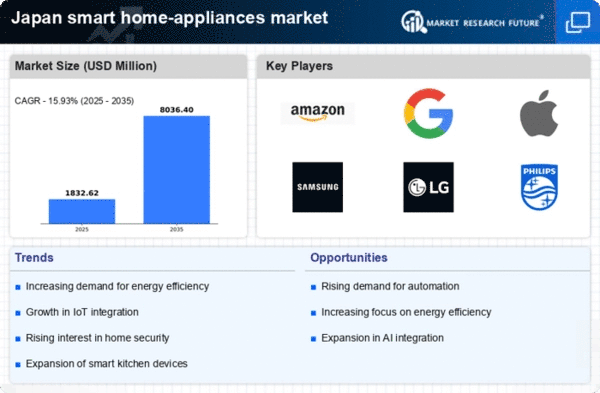The smart home-appliances market in Japan is characterized by a dynamic competitive landscape, driven by technological advancements and evolving consumer preferences. Major players such as Amazon (US), Google (US), and Samsung (KR) are at the forefront, each adopting distinct strategies to enhance their market presence. Amazon (US) focuses on integrating its Alexa voice assistant into a wide range of devices, thereby fostering a seamless ecosystem for users. Google (US), on the other hand, emphasizes AI-driven solutions, enhancing user experience through smart home integration. Samsung (KR) leverages its extensive product portfolio, aiming for innovation in connectivity and energy efficiency, while also exploring partnerships to expand its reach. Collectively, these strategies contribute to a competitive environment that is increasingly centered around user-centric innovations and technological integration.
Key business tactics within this market include localizing manufacturing and optimizing supply chains to enhance efficiency and reduce costs. The competitive structure appears moderately fragmented, with several key players exerting influence over market dynamics. This fragmentation allows for a diverse range of products and services, catering to varying consumer needs and preferences. The collective actions of these companies shape a landscape where innovation and strategic partnerships are paramount.
In October 2025, Amazon (US) announced the launch of its new line of smart home devices, which integrate advanced AI capabilities to enhance user interaction. This strategic move is significant as it not only reinforces Amazon's commitment to innovation but also positions the company to capture a larger share of the market by appealing to tech-savvy consumers seeking enhanced functionality in their smart home systems. The integration of AI is likely to set a new standard for user experience in the industry.
In September 2025, Google (US) unveiled a partnership with a leading Japanese home appliance manufacturer to co-develop smart appliances that utilize Google Assistant. This collaboration is indicative of Google's strategy to deepen its penetration in the Japanese market, leveraging local expertise to tailor products that resonate with consumer preferences. Such partnerships may enhance product relevance and drive adoption rates among Japanese consumers, thereby strengthening Google's competitive position.
In August 2025, Samsung (KR) launched a sustainability initiative aimed at reducing the carbon footprint of its smart home appliances. This initiative includes the introduction of energy-efficient products and a commitment to sustainable manufacturing practices. The strategic importance of this move lies in the growing consumer demand for environmentally friendly products, which could enhance brand loyalty and attract a broader customer base concerned with sustainability.
As of November 2025, current trends in the smart home-appliances market are heavily influenced by digitalization, sustainability, and AI integration. The emphasis on strategic alliances is reshaping the competitive landscape, allowing companies to pool resources and expertise to drive innovation. Looking ahead, competitive differentiation is expected to evolve, with a notable shift from price-based competition to a focus on technological innovation, reliability in supply chains, and sustainable practices. This transition suggests that companies that prioritize these aspects will likely emerge as leaders in the market.
















